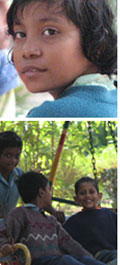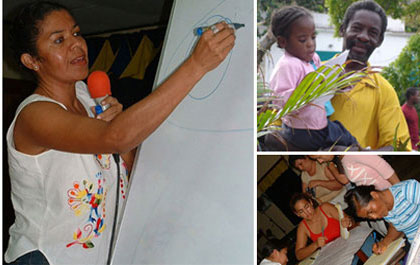




Alternative knowledges
One of our main concerns is to develop knowledge partnerships to foster democratic and participatory processes for the production of knowledge. Here is some of our work in this area:
Constructing a North-South Knowledge Community for Development Research and Practice: ISHD has just received funding for this project from SSHRC’s International Opportunities Fund. Its co-applicant for the project is Centro Boliviano de Estudios Multidisciplinarios (CEBEM), Bolivia. Other partners are Universidad Autonoma del Estado de Mexico; Simon Fraser; UBC and University of Victoria. It explores approaches to the co-creation of knowledge – co-created with partners in the North and South on the one hand, and universities and communities on the other.
The proposed Knowledge Community will have six distinctive dimensions (a) it will adopt a broad understanding of Development, encompassing social, cultural, human and ecological dimensions. (b) it will be based on fully equitable and collaborative partnerships between Canadian and Southern partners, with equal participation in agenda-setting, choice of methodologies and execution of research; (c) it will give priority to university-community partnerships; (d) it will make extensive use of Information and Communication Technology (ICT); (e) it will systematically feed research into relevant curricula in Canada and Latin America; and (f) it will encourage North-South as well as South-South learning.
Partnership with CEBEM, Bolivia: ISHD and the Bolivian Multidisciplinary Studies Centre (CEBEM) have partnered on the “Cooperation, Knowledge and Development: A North-South Project for Cooperation and Training (Latin America – Caribbean – Canada)”. This collaboration will result in the creation of short online courses in the theme of Human and Social Development to update professionals in the field. There will be mutual use of institutional portals, virtual libraries and bulletins. This collaboration will also involve the preparation of joint proposals to disseminate knowledge and experiences around this theme.
Repository of case studies on Women and Social change: In September 2004, ISHD received funding from the International Development Research Centre (IDRC), Canada to develop curricular material to be used in teaching gender-related training. Visit our website for more.
Corporatization of the Voluntary Sector, directed by Prof.Fahimul Quadir: This interdisciplinary study, funded by SSHRC, calls into questions the theoretical distinction between the state, the market and civil society which dominates contemporary development discourse. By taking a deep look at the current process of the changing traditional identities of development NGOs, this study aims to shed light on the growing difficulties in separating development NGOs from corporations. This study revolves around the following three interrelated questions: I) What socio-political factors motivated and/or compelled NGOs to become what can be called more or less corporations? II) To what extent does the current process of ‘corporatization’ of NGOs affect their ability to assist such marginalized groups as women, peasants, homeless and landless, and ethno-religious minorities in achieving the goals of human development in a sustainable manner? III) How does the transformation of NGOs pose challenges to the epistemology of Development Studies?
Partnership with ART-Universitas: Our collaborative effort, the Human Development Resource Network (HDRNet) is a specialised information gateway and electronic library on human development and international co-operation. HDRNet is part of an international collaborative effort that brings together United Nations organisations, donors, practioners and academics, enabling a broad community of participants from many different parts of the world to contribute material they consider relevant to the research and practice of human development. It also archives a wealth of material that is not available through the internet or in other libraries, and makes it available in four languages. HDRNet offers unrestricted access to the documents it archives. Visit HDRNet
With ART-Universitas, we also collaborate on an electronic journal Universitas Forum. We are planning a forthcoming issue entitled Knowledge for Development. Visit the website for more details.
Aid Effectiveness and the Return of the Technocratic Rationality Narrative, directed by Prof.Fahimul Quadir: Given increased emphasis on fostering a ‘culture of results’, this study aims to examine a broad range of fiercely debated contemporary issues that seemed to have shaped the practice of development in recent years. In particular, it seeks to elucidate the general meanings and practical implications of the widely stated but largely unexplored assertion that focusing on results through a new style of management can make better policy decisions and help design better strategies that contribute to improving the poverty conditions in much of the developing world. This study calls into question the assumption that “managing for results” will make development efforts more effective in achieving the Millennium Development Goals (MDGs) by 2015. It claims that increased efforts to manage for results have created a new development narrative which has in effect rekindled and renewed the spirit and vision of the modernity discourse that once legitimized the dominant role of technocrats and bureaucrats in the development process. Instead of creating viable popular organizations capable of promoting enabling settings for people’s self-development, the new language of development necessitates the need for grassroots and community-based organizations to look outside for their own development. It argues that the changing development narrative is likely to restrict and limit the political space necessary for civil society association, especially people’s organizations, to promote “autonomous” development aimed at strengthening local people’s self-management capacities.
Links
- Award 2011: Millennium Development Research Grant, Shastri Insitute (SICI), 2011
- Constructing a North-South Knowledge Community: Social Science & Humanities Research Council Canada (SSHRC), award 2010
- Development after the Global Meltdown, Shastri Insitute (SICI) award, 2009
- Recent publications by ISHD members
- Universitas Forum, an international journal

